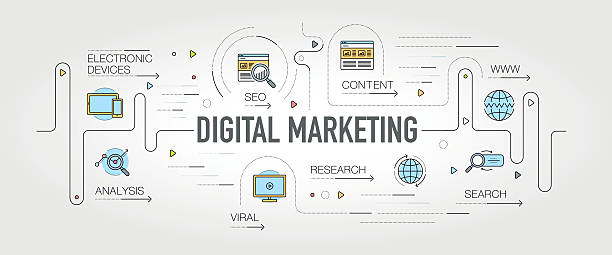History and Evolution of Digital Marketing
Do you realize that every minute, over 3.8 million individuals use search engines to do searches? Isn’t that an enormous number?
The average daily intake of digital information is six hours and 59 minutes, according to a recent poll. Without a doubt, the entire globe has become technologically aware. One of the main reasons why firms began to experiment with new marketing strategies is because of the widespread usage of the internet.
This is how the concept of digital marketing came to be.
With such a large number of internet visitors, any company must have a powerful and effective online presence. Digital marketing is unquestionably one of the most effective marketing strategies for attracting customers to your company.
History and Evolution of digital marketing
Digital marketing, which was first coined in the 1990s, has progressed at a rapid rate. Many firms are now utilising this incredible marketing strategy to stand out in the digital marketplace. After all, digital marketing is an excellent online marketing strategy for raising brand awareness, increasing website traffic, and expanding your consumer base.
Digital Marketing in the 90s
For all firms, digital marketing has become a critical marketing approach. Digital marketing is crucial for all businesses, whether you own a small business, a mid-sized agency, or a large corporation. Digital marketing arose from the prevalence of personal computers. People began using personal computers to shop online in the 1990s.
Digital Marketing in the 2000s
Consumer behaviour shifted dramatically in the 2000s. Before making any purchasing decisions, many buyers are conducting online research on a product. Many organisations have been compelled to adjust their digital marketing strategies as a result of this huge upheaval. With the introduction of automation platforms, this problem was solved. Marketo, Act, and Pardot were among the first companies to create automation solutions. This launch has aided many marketers in efficiently conducting multi-channel campaigns. Apart from that, these technologies were created to automate marketing efforts and track their results to gain a better understanding of customer purchasing patterns. In the 2000s, there was also a surge in social media marketing. Many new social media networking sites have been launched to assist businesses in their growth.
What is Digital Marketing?
In simple terms, digital marketing, often known as online marketing, is a low-cost marketing method that uses electronic devices and the internet to contact your target audience and engage with potential clients. Digital marketing, unlike traditional marketing methods, is an excellent way to promote your products and services via digital channels such as websites, search engines, social media networking sites, mobile apps, email, and more.
1. Digital Devices: Digitalization has undeniably changed practically every area of our life. Digital devices (smartphones, game consoles, laptops, and televisions) are now ubiquitous in our daily life. You may effortlessly connect, engage, and communicate with your intended audience all over the world with these devices.
2. Digital Platforms: Search engines, social media marketing platforms, and other digital platforms are all used in digital marketing. The buyer’s journey begins with search engines such as Bing, Google, and Yahoo. People use search engines to discover answers to their questions or to learn more about a particular topic. Search engine optimization can help you get your business found online if you include it in your online marketing strategy. It increases the likelihood of your prospects landing on your website and converting.
3. Digital Media: “Digital Media” is the third D in digital marketing. This covers a variety of paid, earned, and owned communication channels that enable you to reach and engage with your target audience. This allows you to attract a larger number of potential clients and raise your company’s return on investment.
4. Digital Data: The relevant and necessary information about your potential consumers is contained in digital data. You can use the information to turn prospective clients into paying customers. In reality, the information can be used to analyse purchase habits and preferences. Surveys, contact forms, applications, contests, and other methods can be used to collect digital data.
5. DIgital Technology: Every day, digital marketing evolves and offers new and exciting options. Techniques that worked perfectly yesterday may not produce the same outcomes today. As a result, keeping up with the latest digital marketing trends is critical.
If you need assistance with digital marketing, check out more Republic info here.

